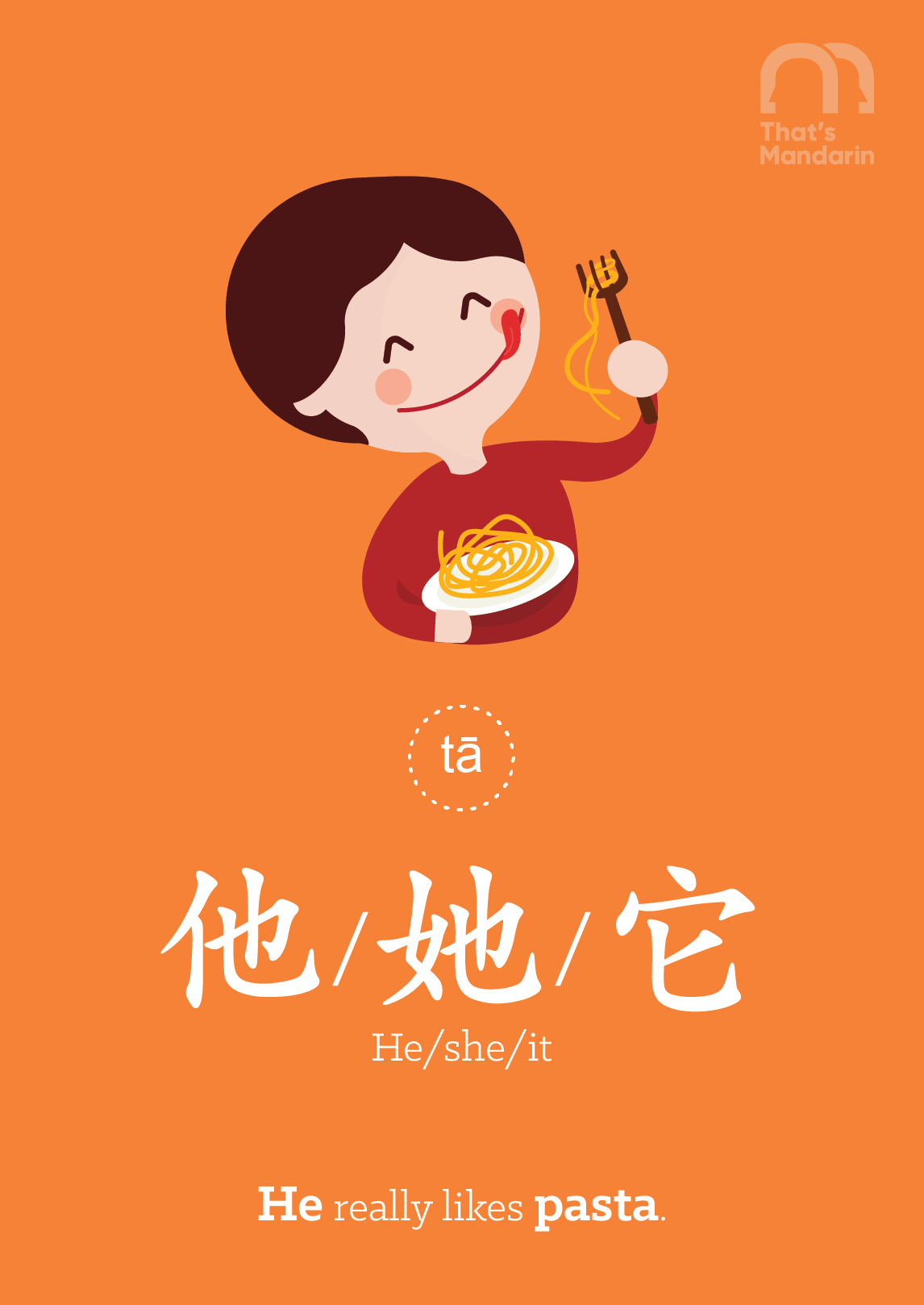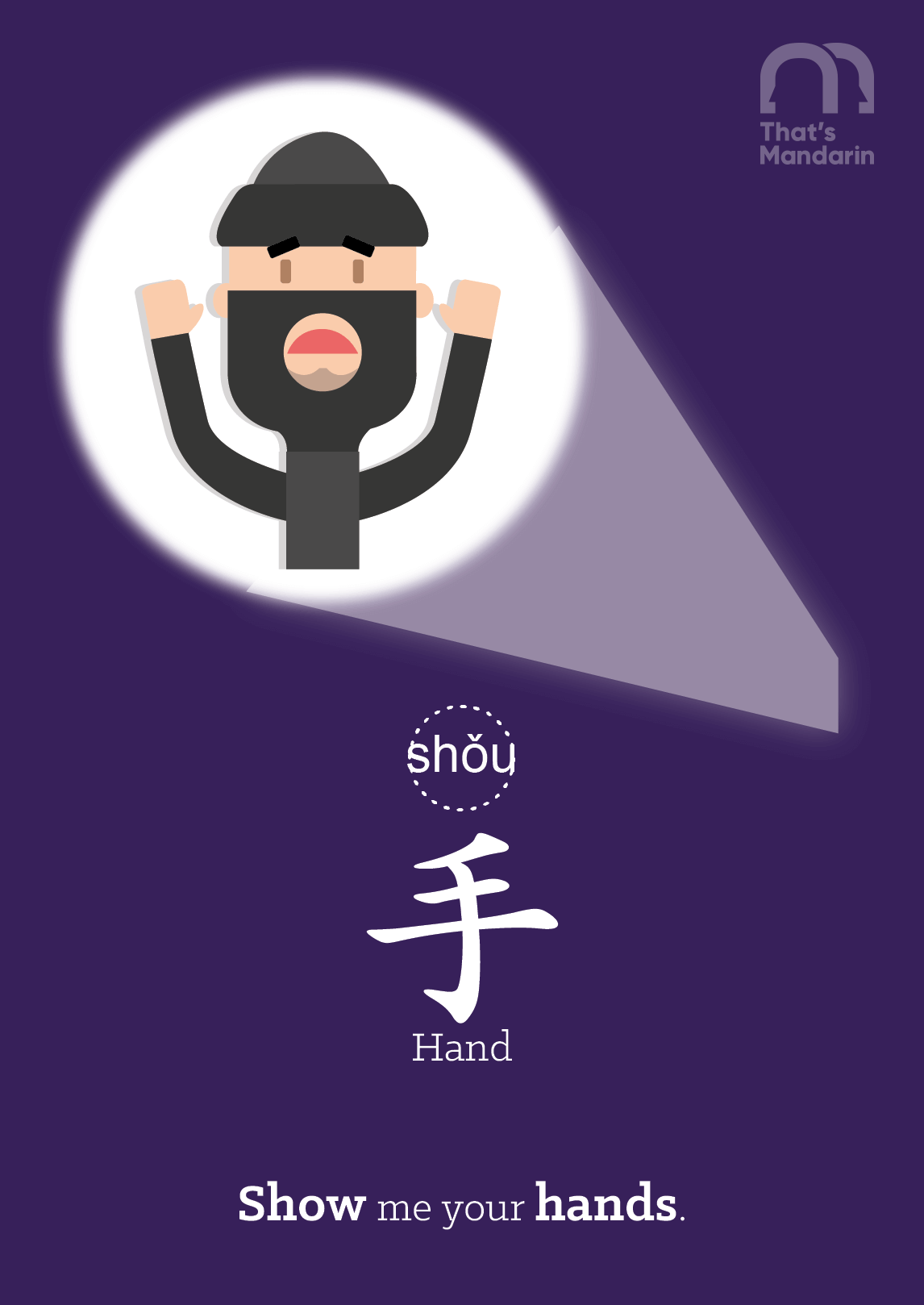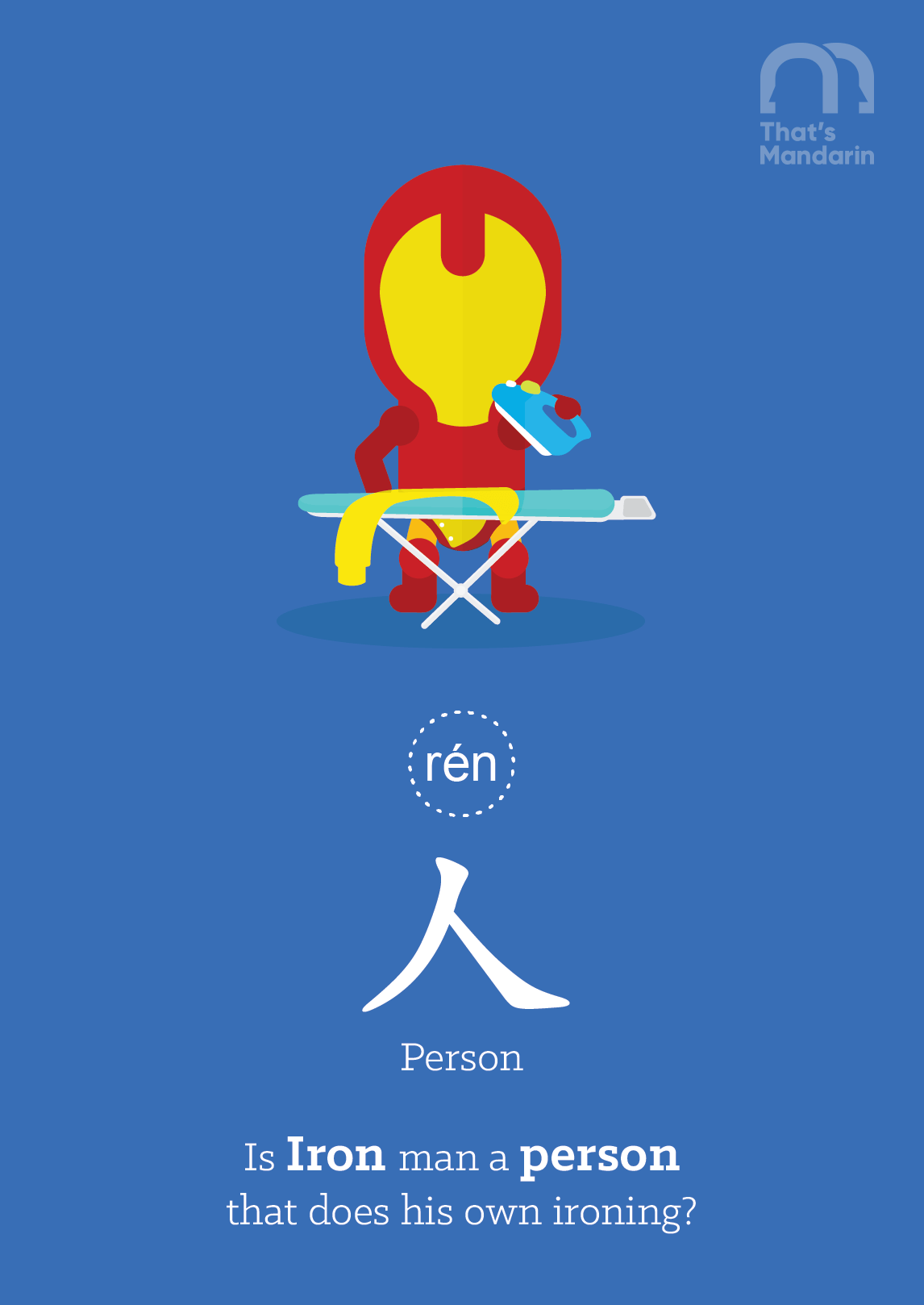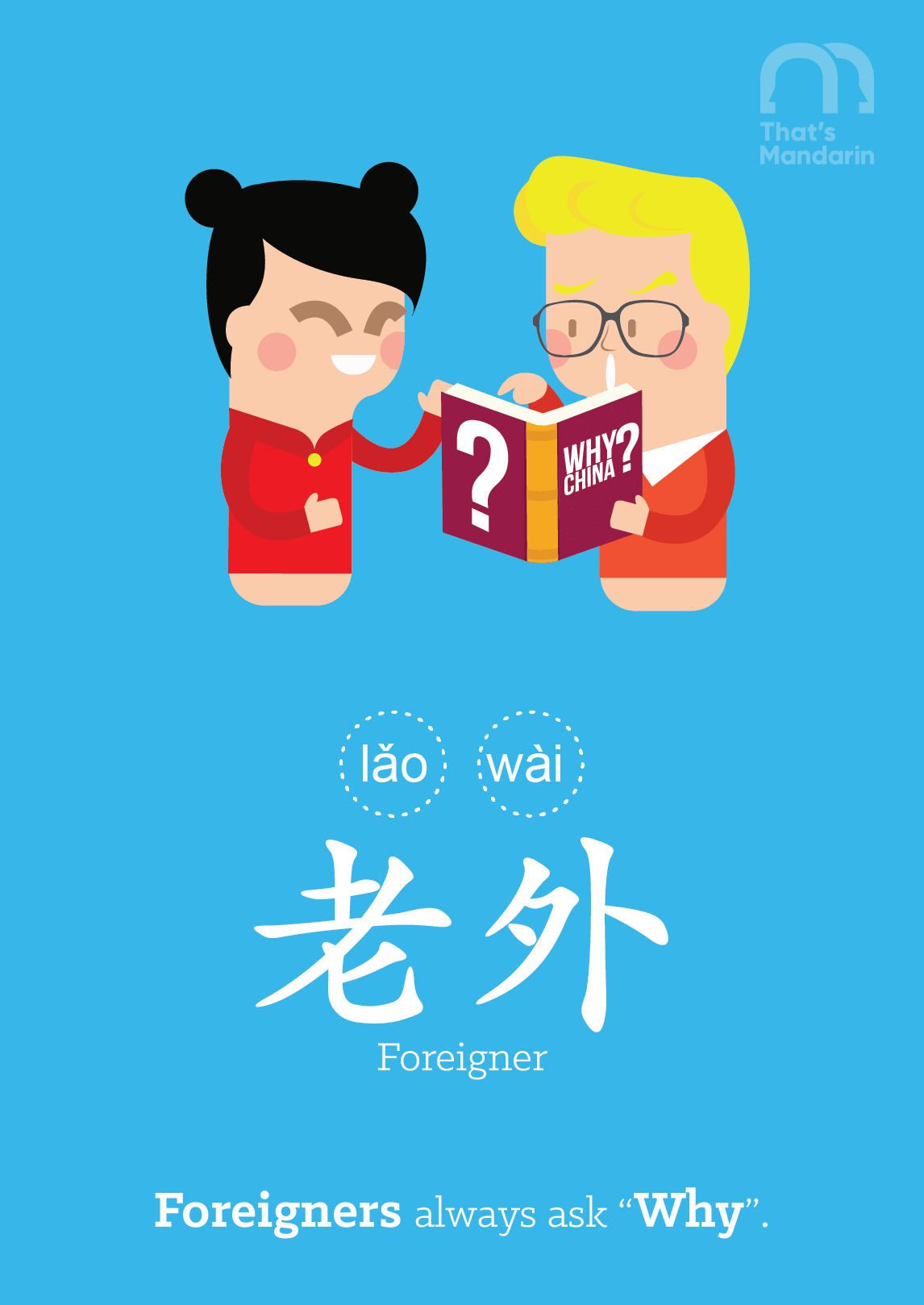Chinese Link Words: Learn 4 Basic Chinese Nouns
He, she, it (他、她、它)
In Chinese, the words “he”, “she” and “it” have the same pronunciation, which is “tā”.
It sounds like “ta” in the word “pasta” so that the link sentence “He really likes pasta” can help you remember this word.
So next time when you want to ask “What’s his/her name”, you can say:
他叫什么名字?
Tā jiào shénme míngzì?
Although “he/she/it” have the same pronunciation, their characters are different.
The character 他 means “he”; 她 means “she” and 它 means “it”.
It is not very difficult to tell “他” and “她”, because there is a 亻 in 他 which means “man”, and there is a 女 in 她 which means “woman”. Meanwhile, 它, which is used to represent “it”, has the shape of a snake and can also be found in the character of snake 蛇 (shé).
Hand | 手 (shǒu)
手 (shǒu) means “hand”.
It sounds like the English word “show”, so the sentence of the picture “SHOW me your hands” can help you remember this word.
Now you must want to learn “left hand” and “right hand”.
In Chinese “left” is 左 (zuǒ), which sounds like “Zo” in the name “Zorro”. So the sentence of the second picture “Zorro is left-handed” may help you remember this word.
And the Chinese word for “right” is 右 (yòu). An easier sentence “you are right” can help you remember this word too.
Finally, how do Chinese people say “cellphone”? That is 手机 (shǒujī), which literally means “hand machine”.
Person | 人 (rén)
人 (rén) means “person”, and it sounds like “ron” in the English word “iron”. The link sentence “Is Ironman a person that does his own ironing?” can help you remember this word.
Now, let’s make some phrases!
How do you say “Chinese people”?
Don’t hesitate! It’s 中国人 (zhōngguórén)!
Let’s learn another phrase. Do you still remember how to say “love” in Chinese?
Yes, it’s 爱 (ài). Therefore 爱人 (àirén) means “someone you love”. It can represent both wife and husband.
Foreigner | 老外 (lǎowài)
The old-fashioned word for “foreigner” is 洋人(yángrén). Here 洋 (yáng) means “ocean” and 人 (rén) means “person”.
Ancient Chinese believed that the entire world consisted of the territory of China, at the time envisioned as nothing more than a floating square of land surrounded by a body of water. So we called Westerners 西洋人 (xīyáng rén), which meant “people from the west ocean”; Japanese 东洋人 (dōngyáng rén) “people from the east ocean”; and people from South East Asia – 南洋人 (nányángrén), which meant “people from the east ocean”.
Now Chinese have a new word for foreigners (especially for western people): 老外 (lǎowài).
The original meaning of 老 (lao) is “old” and here it is just a prefix and expresses a feeling of friendliness. 外 (wài) means “outside” or “foreign” and sounds exactly like the English word “why”.
The sentence that can help you remember this word is: “Foreigners always ask why.”
He, she, it (他、她、它)
In Chinese, “he/she/it” have the same pronunciation, which is “tā”.
It sounds like “ta” in the word “pasta” so that the link sentence “He really likes pasta” can help you remember this word.
So next time when you want to ask “What’s his/her name”, you can say:
他叫什么名字?
Tā jiào shénme míngzì?
Although “he/she/it” have the same pronunciation, their characters are different.
The character 他 means “he”; 她 means “she” and 它 means “it”.
It is not very difficult to tell “他” and “她”, because there is a 亻 in 他 which means “man”, and there is a 女 in 她 which means “woman”. Meanwhile, 它, which is used to represent “it”, has the shape of a snake and can also be found in the character of snake 蛇 (shé).
Hand | 手 (shǒu)
手 (shǒu) means “hand”.
It sounds like the English word “show”, so the sentence of the picture “SHOW me your hands” can help you remember this word.
Now you must want to learn “left hand” and “right hand”.
In Chinese “left” is 左 (zuǒ), which sounds like “Zo” in the name “Zorro”. So the sentence of the second picture “Zorro is left-handed” may help you remember this word.
And the Chinese word for “right” is 右 (yòu). An easier sentence “you are right” can help you remember this word too.
Finally, how do Chinese people say “cellphone”? That is 手机 (shǒujī), which literally means “hand machine”.
Person | 人 (rén)
人 (rén) means “person”, and it sounds like “ron” in the English word “iron”. The link sentence “Is Ironman a person that does his own ironing?” can help you remember this word.
Now, let’s make some phrases!
How do you say “Chinese people”?
Don’t hesitate! It’s 中国人 (zhōngguórén)!
Let’s learn another phrase. Do you still remember how to say “love” in Chinese?
Yes, it’s 爱 (ài). Therefore 爱人 (àirén) means “someone you love”. It can represent both wife and husband.
Foreigner | 老外 (lǎowài)
The old-fashioned word for “foreigner” is 洋人(yángrén). Here 洋 (yáng) means “ocean” and 人 (rén) means “person”.
Ancient Chinese believed that the entire world consisted of the territory of China, at the time envisioned as nothing more than a floating square of land surrounded by a body of water. So we called Westerners 西洋人 (xīyáng rén), which meant “people from the west ocean”; Japanese 东洋人 (dōngyáng rén) “people from the east ocean”; and people from South East Asia – 南洋人 (nányángrén), which meant “people from the east ocean”.
Now Chinese have a new word for foreigners (especially for western people): 老外 (lǎowài).
The original meaning of 老 (lao) is “old” and here it is just a prefix and expresses a feeling of friendliness. 外 (wài) means “outside” or “foreign” and sounds exactly like the English word “why”.
The sentence that can help you remember this word is: “Foreigners always ask why.”
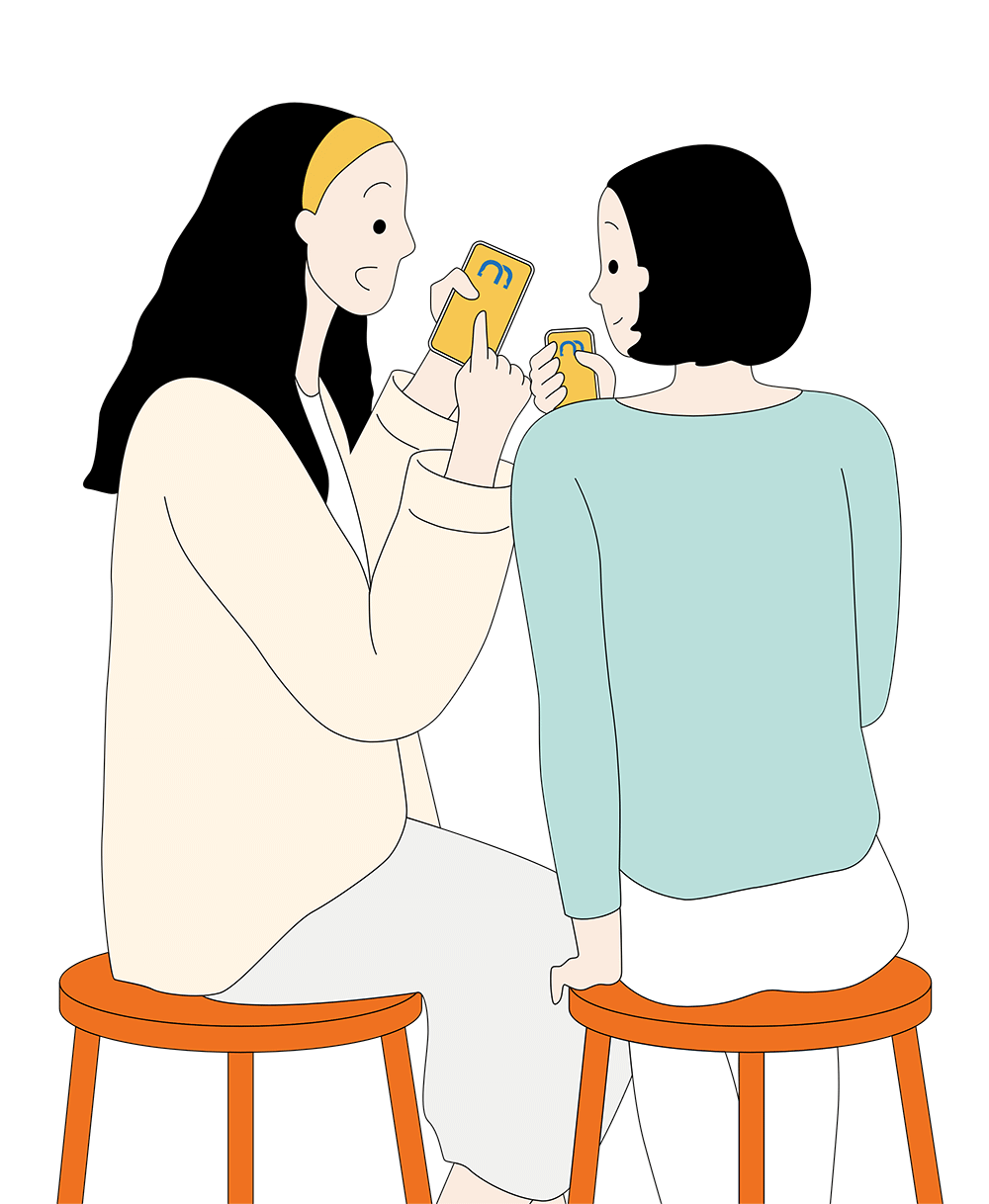
Study Chinese
with us
Learn More About Our Programs
Study Chinese with us
Learn More About Our Programs


